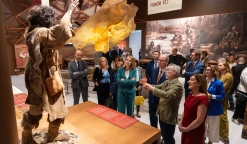Documentary articles

Joyeux Noël !
Le Comité Albert Ier vous souhaite de très belles fêtes de fin d'année.

Nouveau numéro des Annales monégasques
Le numéro 48, pour l'année 2024, de la revue d'Histoire de Monaco paraît cette semaine.

Festival du livre gourmand à Périgueux
Se tient à Périgueux, du vendredi 15 au dimanche 17 novembre, le foisonnant festival du livre gourmand de Périgueux (un secteur éditorial en pleine effervescence).

Exposition "Les Açores - Un jardin sur l'Atlantique" à la villa Tamaris
S.A.S. le prince Albert II de Monaco était le vendredi 11 octobre 2024 à La Seyne-sur-Mer, à la villa Tamaris, pour découvrir l'exposition photographique de Micheline Pelletier "Les Açores, un jardin sur l'Atlantique". Une exposition qui salue le travail scientifique de son trisaïeul, le prince Albert Ier, qui effectua 13 expéditions dans cet archipel portugais. L'exposition est ouverte du 12 octobre 2024 au 5 janvier 2025.

L'Ancêtre de Camille Saint-Saëns
L'Orchestre de Monte-Carlo reprend l'opéra de Camille Saint-Saëns, L'Ancêtre, créé le 24 février 1906 à Monaco, à la demande du prince Albert Ier, ans le cadre d'une soirée de gala au profit du Comité de bienfaisance de la Colonie française de Monaco.

Publication - Actes du colloque de Périgueux
Les actes du colloque "Châteaux, mers et rivages" qui s'est tenu à Périgueux en septembre 2023 viennent de paraître aux éditions Ausonius. On y trouve, dans la quatrième partie "Châteaux phares de la puissance souveraine" , un article intitulé ""Temple de la mer." Le Musée océanographique, un deuxième palais à Monaco (1848-1922)".

Retour en Cantabrie
Lors d'un précédent article, nous avons évoqué l'actualité de la visite du Souverain, S.A.S. le Prince Albert II, à Puente Viesgo, en Cantabrie, pour inaugurer un nouveau musée, le Centre d'art rupestre de Cantabrie (CARC) et son exposition temporaire.

Soutenance de thèse de doctorat
Hier, dans l'amphithéâtre de la Maison des Océans, rue Saint-Jacques à Paris, Thomas Blanchy, a été reçu docteur en histoire de Sorbonne Université.

Hommage aux Açores

Hommage au prince Albert Ier en Espagne
En Espagne, SA.S. le prince Albert II de Monaco a visité un musée portant le nom de son trisaïeul le prince Albert Ier.